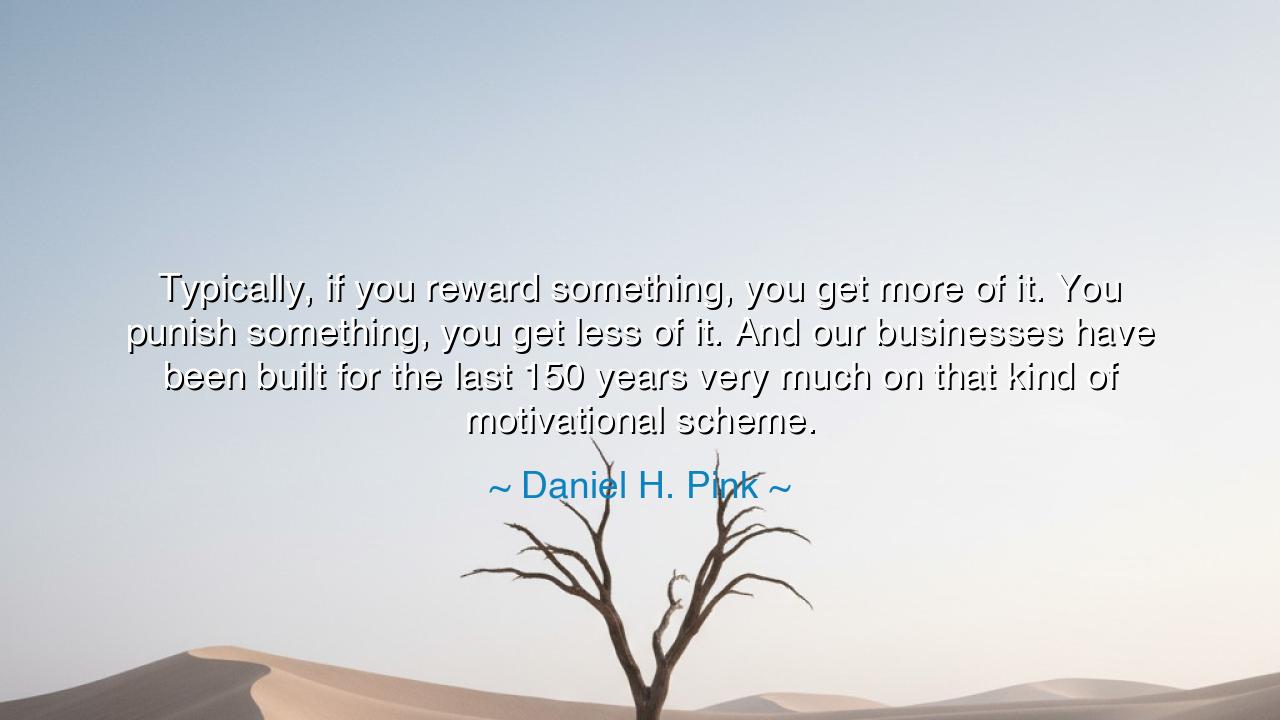
Typically, if you reward something, you get more of it. You
Typically, if you reward something, you get more of it. You punish something, you get less of it. And our businesses have been built for the last 150 years very much on that kind of motivational scheme.






In the words of Daniel H. Pink, a thinker who has devoted much of his life to studying human behavior and work, we hear an ancient principle clothed in modern language: “Typically, if you reward something, you get more of it. You punish something, you get less of it. And our businesses have been built for the last 150 years very much on that kind of motivational scheme.” These words describe not only the practice of management, but the eternal laws by which rulers, teachers, and parents have long sought to shape the actions of men. It is the law of incentive and deterrent, of pleasure and pain, that has guided the building of empires and the forging of nations.
To reward is to plant seeds in the soil of desire. It says to the heart, “Do this, and you shall prosper.” To punish is to draw lines in fire, warning the soul, “Do this, and you shall suffer.” For centuries, leaders and masters relied on these twin forces, believing they could bend the will of others as one bends a branch. And indeed, this method has power: the farmer trains his ox with carrot and stick, the commander binds his army with rations and lash, the merchant builds his trade with wage and penalty. Pink reminds us that the very foundation of modern business rests upon this ancient stone.
But history shows us both the strength and the weakness of this way. Consider the builders of the Great Wall of China. Thousands of laborers toiled under the watch of overseers, driven by fear of punishment. The wall rose, magnificent and enduring, but at a cost of countless lives spent like water. Fear built the wall, but it did not build devotion. When invaders came, many who had worked the wall did not defend it with heart, for their labor was compelled, not chosen. Thus we see: while punishment and reward can build structures, they cannot always build loyalty or greatness of spirit.
In contrast, think of the soldiers of Leonidas at Thermopylae, who stood against the Persian tide. They were not promised gold, nor were they threatened with the lash. Instead, they were bound by honor, love of homeland, and devotion to one another. They fought not for reward, nor out of fear of punishment, but for meaning. Though they perished, their story endures because it shows a deeper truth: that beyond the scheme of carrot and stick lies a higher form of motivation—the will that springs from the heart itself.
Pink’s words, then, challenge us to reflect: is this ancient scheme of reward and punishment enough for the world we now inhabit? For 150 years of industry, perhaps it was. It created factories, economies, and corporations. Yet, as the ancients knew, man is not beast alone. He is spirit and mind, yearning not just for survival but for purpose. To confine him only to the cycle of reward and punishment is to dim his fire, to make him less than what he could be.
The meaning of this quote is thus twofold. It reveals the truth of how societies and businesses have long operated, and it also whispers the truth that such a model is incomplete. Just as a plant needs not only sun and soil but also water to flourish, so too does the human soul need not only reward and punishment, but also vision, purpose, and freedom. The ancients would call this areté—the pursuit of excellence for its own sake.
The lesson for us, beloved seekers, is this: use reward and punishment with wisdom, but do not make them your only tools. Whether you lead a family, a business, or your own life, seek also to cultivate meaning. Ask not only, “What will I gain or lose?” but also, “What will I become?” Inspire those around you not just with wages or penalties, but with a vision of dignity and greatness. For in the end, it is not fear or greed that forges the highest deeds, but the fire of purpose.
Practical counsel is this: when setting goals for yourself or others, do not rely only on the promise of reward or the threat of punishment. Add also the question of why. Connect each action to a greater story, a cause that matters, a value that lasts. In doing so, you will rise above the ancient scheme and step into the realm of higher motivation, where men and women act not because they must, but because they choose. And in that choice, they become truly free.






AAdministratorAdministrator
Welcome, honored guests. Please leave a comment, we will respond soon